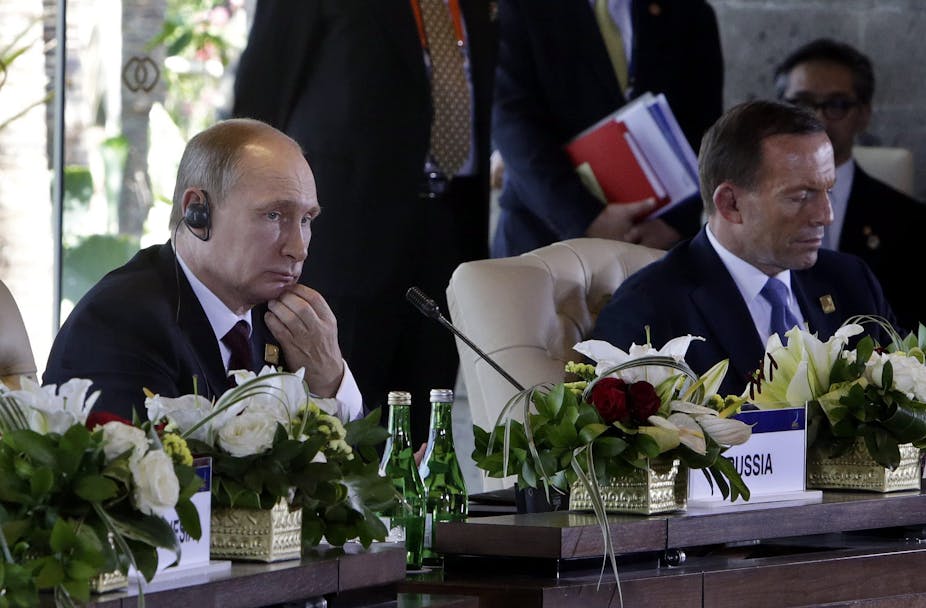Tony Abbott did not repeat his pledge to “shirt-front” Vladimir Putin when pressed on the subject a day after his initial threat. Now the promise is for a “very, very robust conversation” with the Russian president, assuming he does come to the G20 in Brisbane next month.
Abbott said this was “the very least I can do, speaking for Australia’s dead and speaking for the families of Australia’s dead and indeed speaking for the world’s victims”.
But how will the “robust conversation” come about?
Abbott said his program was still being finalised but “I certainly expect that while he’s a guest of Australia, [Putin] will undertake to have a conversation with the Australian Prime Minister”.
The Russian embassy’s second secretary Alexander Odoevskiy told The Conversation that “given the rhetoric from the Australian leadership I see no reason why this meeting should be initiated from the Russian side” (while adding that this was ultimately a matter for the Presidential office, not the embassy).
“Someone needs to initiate the meeting,” he said. “Neither Moscow nor Canberra has done it. If Mr Abbott wants a face to face, it’s normal diplomatic practice that this request is forwarded and considered. The Russian president may decide to have a meeting, or not to.”
Odoevskiy said he thought Abbott had been playing to his domestic audience when he talked about “shirt-fronting”.
Unfamiliar with the football term when Abbott uttered it, Odoevskiy said he’d done some research. “It’s very specific to Australia. Outside Australia not many people can understand straight away what it is.”
Abbott’s remarks “were targeting the Australian public. They were more related to Australian politics – following up the quite insulting and undiplomatic remarks of Bill Shorten”. (Shorten had said Putin knew more than he was letting on about the downing of MH17.)
Odoevskiy said the Russians were “pleased to hear the [Abbott] follow up that he’d like a robust conversation, which sounds like the normal diplomatic practice. But to do that we have to have a bilateral meeting”.
Presumably Abbott will ask for the meeting if there is no request from Putin. If Putin declined, it would look bad for the President rather than for Abbott, although it would be awkward for the PM not to be able to land the “robust conversation” he’d foreshadowed.
There is the option of the sidelines of the APEC meeting in Beijing, which comes just before the G20. Abbott will be there, and Putin is scheduled to be.
Diplomacy would suggest it would be better to get the conversation done ahead of the G20; on the other hand, politics might drive the government to prefer to be seen to be dressing down Putin in Australia.
Abbott was always going to have to wind back his “shirt-fronting” reference, which was inappropriate and unfortunate.
Australia is host to the G20: it might not welcome Putin coming but it has an obligation to ensure that the whole occasion is as smooth and productive as possible. Hyping up a clash with Putin – whose presence is already set to be the media story – is counterproductive for the summit itself, whatever the local politics.
Abbott has pragmatically mixed his language about Putin. When he sought co-operation for people to go the MH17 site to retrieve remains, he adopted a milder tone; at other times he has gone all out.
While it is desirable to bring the strongest pressure onto the Russian leader in relation to both the MH17 downing and its aftermath and Russia’s actions in Ukraine, it should be done in tough but measured terms.
One reason why the shirt-fronting terminology was particularly poor is that it predictably led to send ups in the media and elsewhere. The TV coverage was full of images of Abbott and Putin displaying their physicality and clips of nameless footballers biffing each other. Even the Russian embassy sought to get in on the humour.
Yet the issue is the deaths of many Australians. It is surely distressing and disrespectful to the families suddenly to have their tragedy mired in the macho language of the football field.

